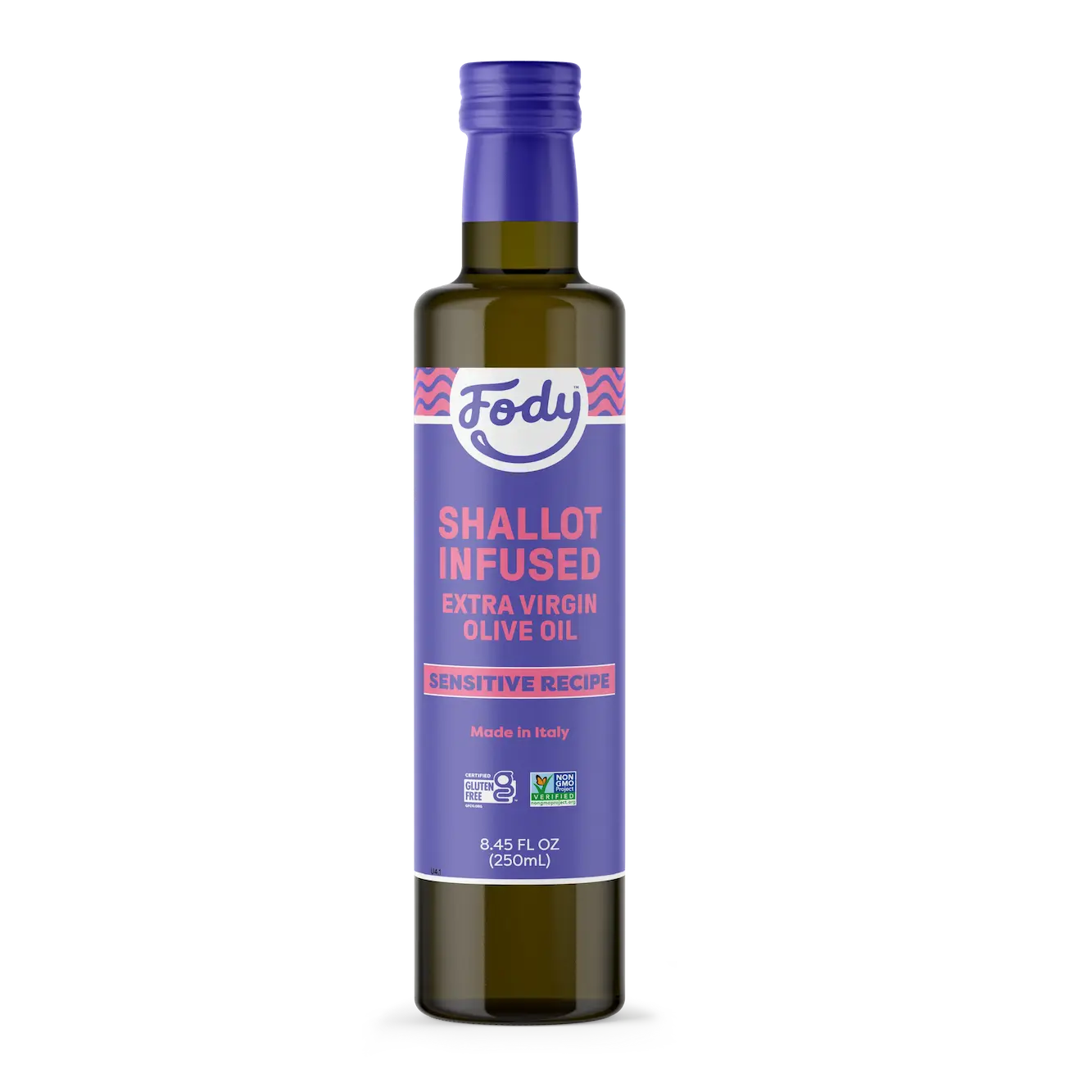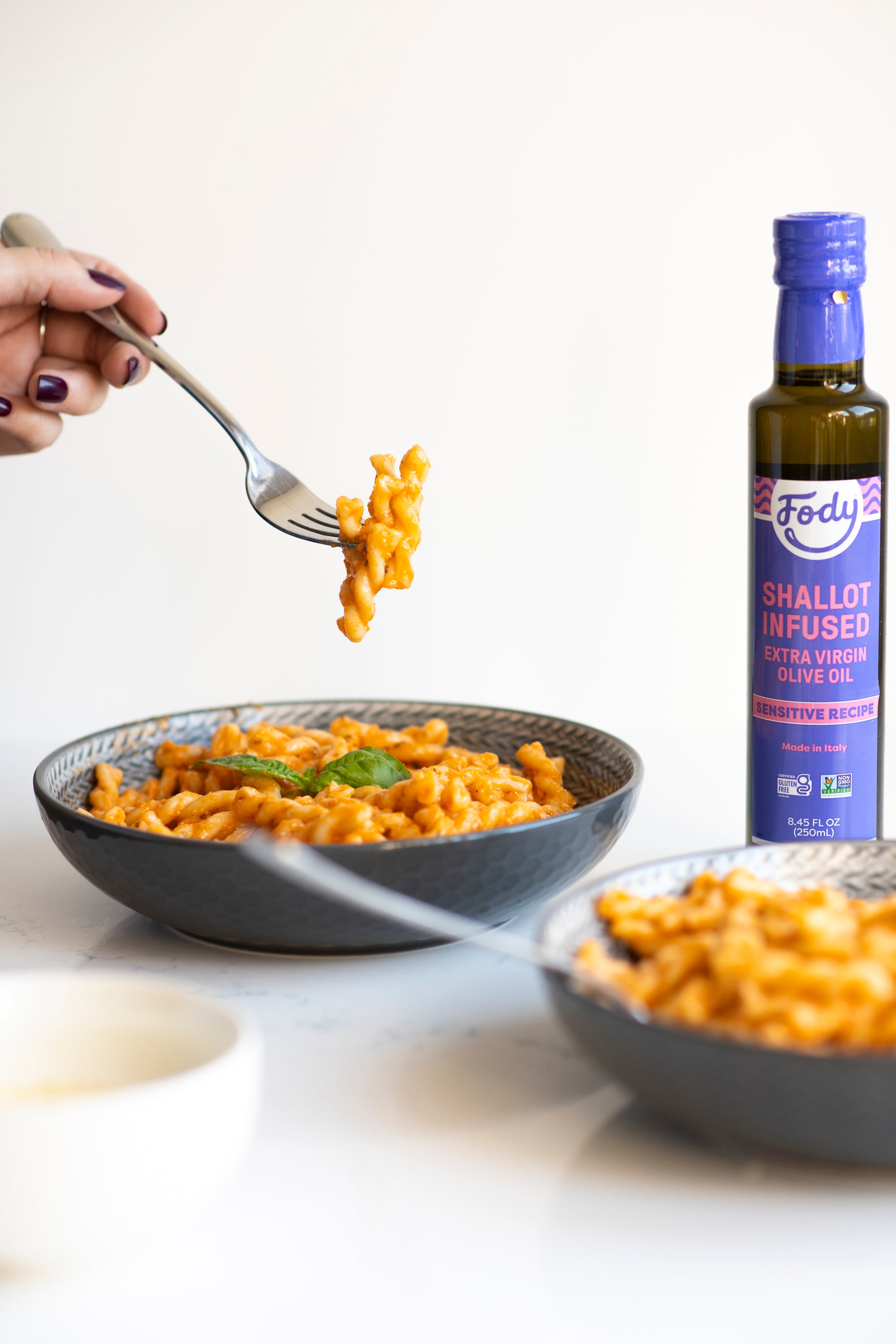

IBS, PCOS, and Diet: Understanding the Gut–Hormone Connection
If you live with IBS and PCOS, you’ve probably noticed that your gut and hormones seem to play off each other — sometimes in perfect harmony, but often in frustrating chaos. One day you feel fine, and the next, bloating, fatigue, or unpredictable digestion can leave you wondering what’s really going on.
It’s not your imagination. Studies show that women with PCOS (Polycystic Ovary Syndrome) are far more likely to experience IBS (Irritable Bowel Syndrome). The connection lies deep within the gut–hormone relationship, where shifts in estrogen, progesterone, and stress hormones directly affect digestion and inflammation.
The good news? With the right dietary approach, you can calm your gut and support hormonal balance simultaneously. In this guide, we’ll break down how IBS and PCOS are linked, what foods help reduce PCOS bloating, and how a Low FODMAP diet for IBS can make managing both conditions easier.
When Hormones Meet the Gut: Why IBS and PCOS Often Overlap
If you’ve been diagnosed with IBS and PCOS, you’re not imagining the connection — the two often go hand-in-hand. Research shows that women with Polycystic Ovary Syndrome (PCOS) are significantly more likely to experience Irritable Bowel Syndrome (IBS) than those without it.
That overlap isn’t a coincidence. Hormonal fluctuations, inflammation, and stress can all affect how your gut works — leading to symptoms like bloating, cramping, and irregular digestion.
Understanding how hormones and gut health interact is the first step toward feeling better. And while there’s no one-size-fits-all diet, a Low FODMAP approach can be a powerful tool to ease symptoms and support hormone balance — especially when paired with IBS-friendly foods from Fody.

What’s the Link Between PCOS and IBS?
Let’s break it down simply.
Polycystic Ovary Syndrome (PCOS) is a hormonal condition that affects how your ovaries function. It’s linked to higher levels of androgens (male hormones) and insulin resistance, which can cause weight changes, fatigue, and irregular periods.
Irritable Bowel Syndrome (IBS), on the other hand, is a functional gut disorder — meaning it impacts how your digestive system works, not its structure. Symptoms like bloating, gas, constipation, or diarrhea are common.
So how are they connected?
-
Hormonal fluctuations in estrogen and progesterone can directly affect gut motility.
-
Insulin resistance and inflammation, common in PCOS, can influence gut bacteria and trigger IBS-like symptoms.
-
Stress and cortisol elevate gut sensitivity, making digestion more unpredictable.
In short, PCOS and IBS share common pathways — stress, inflammation, hormones, and microbiome imbalance. Supporting one often means supporting the other.
Why PCOS Causes Bloating (and How It Differs from IBS Bloating)
If you’ve ever felt uncomfortably full or swollen, you’re familiar with PCOS bloating — one of the most frustrating symptoms of both conditions.
While IBS bloating is often caused by fermentable carbohydrates (FODMAPs) that draw gas and water into the intestines, PCOS bloating can stem from other causes, such as:
-
Hormonal water retention from progesterone and estrogen changes
-
Insulin resistance, which affects digestion and metabolism
-
Slower gut motility, especially during hormonal fluctuations
-
High-sodium or refined-carb diets
The tricky part? Many people experience both types of bloating simultaneously. That’s why understanding your triggers — and adjusting your diet accordingly — can make such a difference.
Can a Low FODMAP Diet Help Manage Both IBS and PCOS?
The Low FODMAP diet was initially developed to help manage IBS symptoms — and it works by reducing certain carbohydrates that ferment in the gut. For people with IBS, cutting down on FODMAPs can significantly reduce gas, pain, and bloating.
But what about PCOS?
While PCOS isn’t treated with Low FODMAP alone, this eating style can indirectly help by:
-
Reducing inflammation: avoiding gut irritants helps calm systemic inflammation, which benefits hormonal balance.
-
Improving insulin response: Low FODMAP meals often emphasize whole, balanced foods that support blood sugar control.
-
Easing digestive load: with less bloating and discomfort, you’re more likely to eat consistently — vital for hormone stability.
Pairing Low FODMAP foods for IBS with balanced macronutrients (protein, fiber, and healthy fats) can help regulate appetite and energy, both key for PCOS management.
Example: Try gluten-free pasta with Fody Marinara Pasta Sauce, grilled chicken, and sautéed spinach. It’s Low FODMAP, balanced, and satisfying — without onion or garlic.
The Best Diet Plan for Managing IBS and PCOS Together
A successful diet for both IBS and PCOS isn’t about restriction — it’s about balance. Here’s how to build meals that support gut comfort and hormonal harmony.
Eat Smart with a Low FODMAP Foundation
Start by identifying and reducing high-FODMAP triggers such as garlic, onion, apples, and wheat. Focus on Low FODMAP swaps instead — like Fody Garlic-Infused Olive Oil, Pasta Sauces, and Snack Bars.
Balance Your Plate
Aim for:
-
Protein: lean chicken, tofu, eggs, fish
-
Complex carbs: quinoa, oats, rice
-
Healthy fats: olive oil, avocado, nuts
-
Gentle fiber: add Gentle Prebiotic Fiber to smoothies for gut regularity
|
Focus On |
Avoid or Limit |
|
Low FODMAP fruits (kiwi, berries, oranges) |
High-FODMAP fruits (apples, pears, mango) |
|
Lean protein + healthy fats |
Fried foods + refined sugars |
|
Fody Snack Bars for travel |
Artificial sweeteners, carbonated drinks |
|
Gentle prebiotic fiber |
Wheat bran or heavy legumes |
Support Blood Sugar & Digestion
Eating smaller meals more frequently can stabilize blood sugar and reduce IBS flare-ups. Combining protein with every meal helps prevent crashes that trigger cravings or fatigue — common with PCOS.
Hydrate and Move
Hydration supports digestion and hormone balance. Pair water with light movement — even 10-minute walks after meals can reduce bloating and help insulin work more efficiently.
Beyond Food: Lifestyle Tips to Support Gut and Hormonal Health
Managing IBS and PCOS isn’t only about diet — it’s about how you live, rest, and de-stress.
Prioritize Sleep
Poor sleep increases cortisol and insulin resistance, worsening both IBS and PCOS symptoms. Aim for 7–8 hours of consistent rest.
Move in Ways You Enjoy
Exercise helps regulate hormones and supports digestion. Choose low-impact options like walking, yoga, or pilates, which also reduce gut tension.
Manage Stress
Stress activates the gut–brain axis, making IBS flare-ups more likely. Breathing exercises, meditation, or even short breaks can make a noticeable difference in digestion and mood.
Stay Consistent
Both IBS and PCOS improve with routine, consistent eating, sleeping, and self-care habits are the foundation of long-term relief.
Fody Foods: Your Partner in Gut-Friendly, Hormone-Smart Eating
When you’re balancing hormonal and digestive health, the last thing you need is complicated meal prep. Fody Foods makes Low FODMAP eating simple, flavorful, and accessible.
Why Fody Works for IBS and PCOS
All Fody products are:
-
Certified Low FODMAP
-
Gluten-free, vegan, and non-GMO
-
Made without onion or garlic
-
Created for everyday comfort and flavor
Travel & Daily Staples
-
Snack Bars: Easy, IBS-friendly energy between meals
-
Pasta Sauces: Balanced dinners made quick and gut-safe
-
Seasonings: Add taste without triggers
-
Gentle Prebiotic Fiber: Supports gut regularity and comfort
With Fody, you can enjoy real food and real flavor — without worrying about bloating or discomfort.
Frequently Asked Questions
Can IBS and PCOS occur together?
Yes — IBS and PCOS frequently occur together, especially in women of reproductive age. Both involve hormone and stress-related imbalances that affect digestion, inflammation, and metabolism. PCOS disrupts estrogen and progesterone levels, which can slow digestion and increase bloating, while IBS heightens gut sensitivity. This overlap often leads to alternating constipation, bloating, or cramps. Managing both requires a steady diet, hydration, movement, and stress control. A Low FODMAP approach can help calm IBS symptoms while supporting gut health. When combined with balanced nutrition, it brings relief and makes daily life more comfortable.
How does PCOS cause bloating and digestive discomfort?
PCOS bloating is mainly hormonal, caused by fluctuating estrogen and progesterone, which can slow digestion and promote water retention. Many with PCOS also experience insulin resistance, making the gut more reactive to certain foods. Unlike IBS, which results from fermentable carbs, PCOS bloating often relates to hormones, high-sodium meals, and inactivity. Gentle daily movement, fiber-rich foods, and hydration help reduce discomfort. For those managing both conditions, avoiding onions and garlic while adding gentle prebiotic fiber can support regularity without worsening symptoms, helping you feel lighter and more in control throughout your cycle.
Can a Low FODMAP diet help with both IBS and PCOS?
While primarily designed for digestive relief, a Low FODMAP diet for IBS can also benefit PCOS by reducing inflammation and improving blood-sugar balance. Limiting fermentable carbohydrates eases gas, bloating, and discomfort, while steady blood sugar helps regulate insulin, a significant factor in PCOS. Together, these effects can stabilize hormones and digestion. Focus on whole foods, lean protein, and gentle fibers. Use Fody Pasta Sauces and Seasonings to create balanced, onion- and garlic-free meals that taste amazing. Always transition carefully and personalize your plan with professional guidance for long-term success.
What foods should I eat if I have both IBS and PCOS?
If you’re managing IBS and PCOS, focus on Low FODMAP, anti-inflammatory, and nutrient-balanced foods. Choose lean proteins like eggs, fish, or tofu; Low FODMAP vegetables such as spinach, zucchini, and carrots; and gentle fibers like Fody Gentle Prebiotic Fiber. Limit refined carbs, processed sugars, and high-FODMAP foods such as onions, garlic, apples, and wheat. Combine protein and complex carbs at every meal to stabilize hormones and prevent blood sugar spikes. Snack smart with Fody Snack Bars or fresh fruit like kiwi to stay full, energized, and comfortable all day.
Conclusion: Nurturing Hormones and Gut Health Through Food
Living with IBS and PCOS can be challenging — but it’s absolutely manageable with the right approach. By tuning into your body, managing stress, and embracing a Low FODMAP lifestyle, you can restore balance from the inside out.
Fody Foods supports that journey by making IBS-friendly eating delicious, convenient, and accessible — so you can feel confident, comfortable, and in control every day.
Eat well. Feel better. Live freely — with Fody.
So, what are you waiting for?
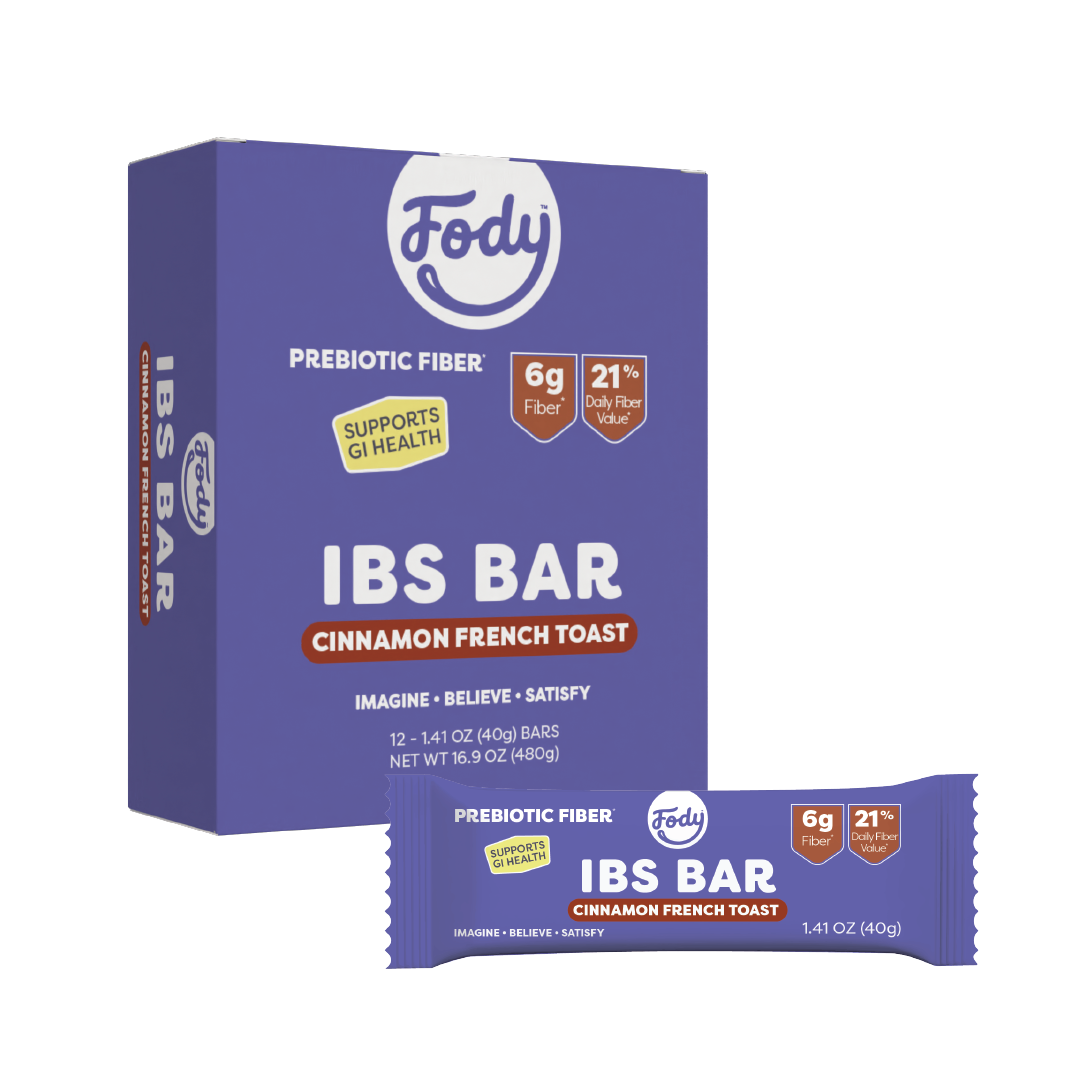
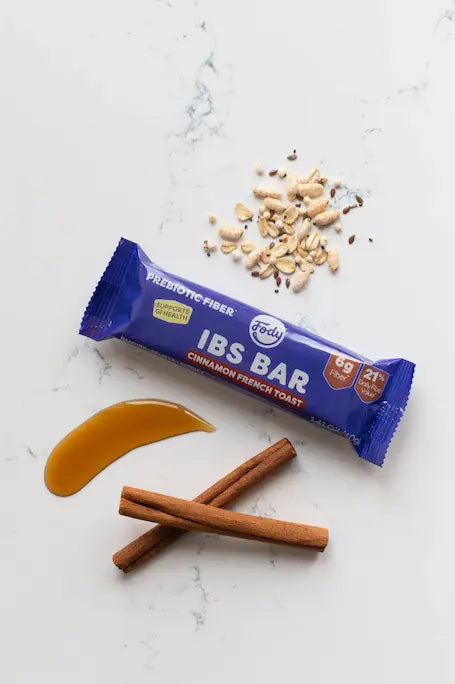 Cinnamon French Toast High Fiber Snack Bar - 12 Pack
Cinnamon French Toast High Fiber Snack Bar - 12 PackCinnamon French Toast High Fiber Snack Bar - 12 Pack
$32.99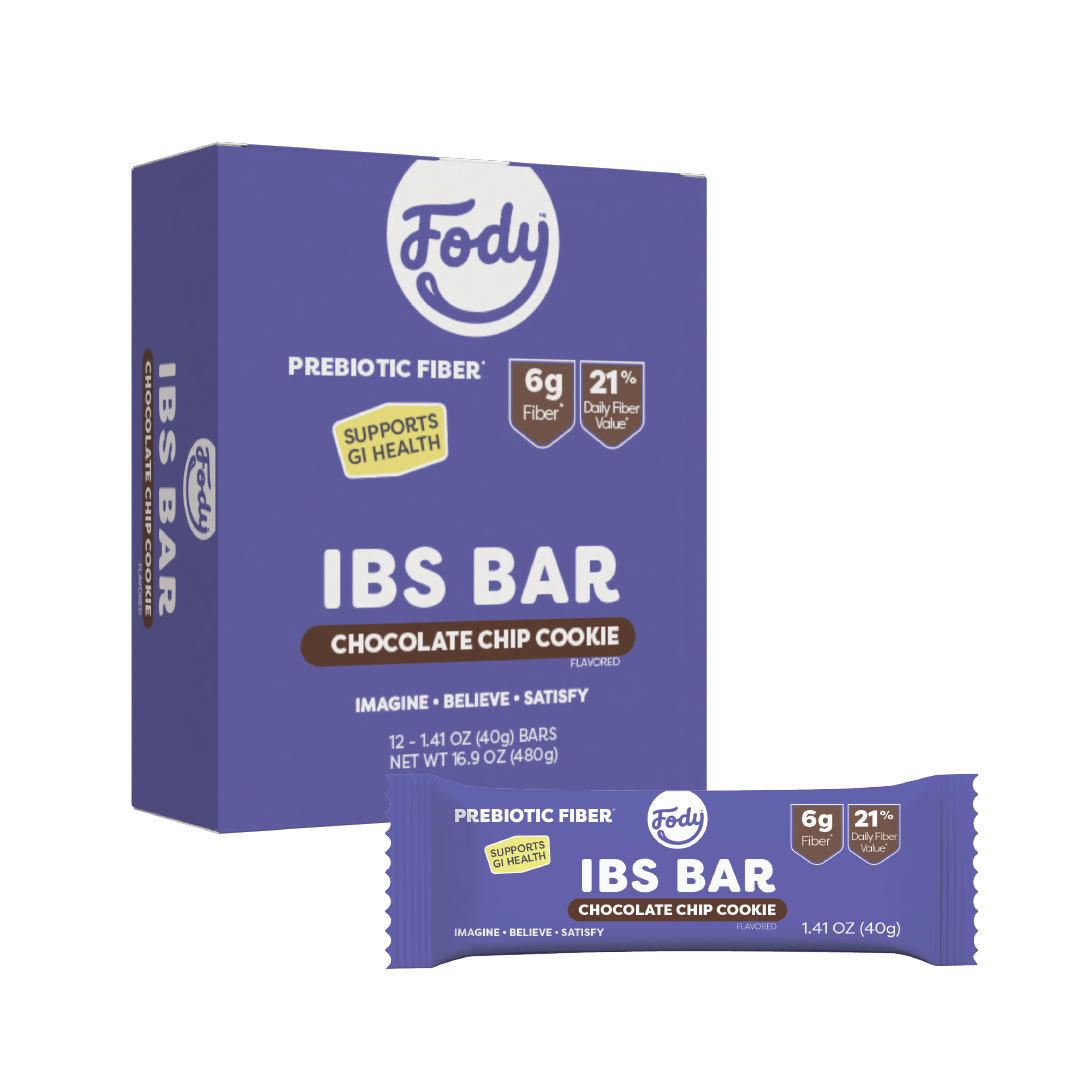
 Chocolate Chip Cookie High Fiber Snack Bar - 12 Pack
Chocolate Chip Cookie High Fiber Snack Bar - 12 PackChocolate Chip Cookie High Fiber Snack Bar - 12 Pack
$32.99











